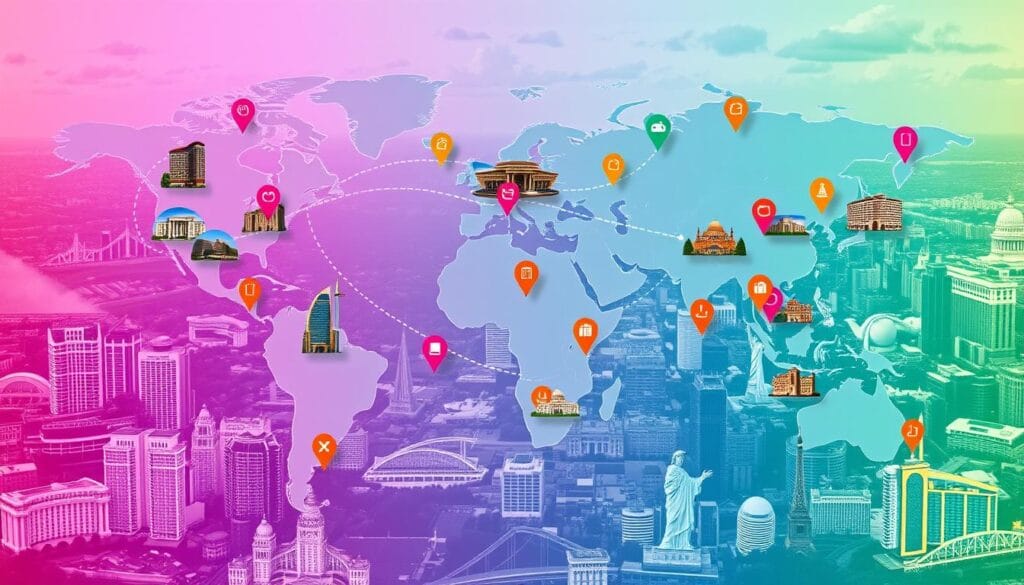רשתות מלונות הפכו לשחקנים חזקים בעולם האירוח. לכל רשת יש זהות ייחודית, פינוקים ואסטרטגיות משלה. הן מגישות לצרכי הנוסעים השונים, מציעות נוחות, שירות וחוויות בלתי נשכחות.
הענקים בתחום האירוח הצורח צורה לתעשייה באופן משמעותי. הבנת ההבדלים ביניהם עשויה לעזור לאורחים לבצע בחירות נבונות יותר. זה יכול גם לשפר את חוויות הנסיעה שלהם.
מסקנות מרכזיות
- גלו את המאפיינים המוגדרים של רשתות מלונות גדולות ואיך הן מבדילות את עצמן בתעשייה.
- הבינו את המגוון השונה של פינוקים ושירותים שמוצעים על ידי רשתות מלונות יוקרה וכלכלה.
- גלו את חשיבות תוכניות נאמנות למותג בעיצוב חוויית המלון.
- חקרו את אסטרטגיות ההרחבה של רשתות מלונות, הן בתוך המדינה והן ברחבי העולם.
- חקרו את התפקיד של המרת דיגיטל בעיצוב עתיד תעשיית המלונאות.
.
הבנת נוף רשתות המלונות
תעשיית המלונאות היא מגוונת ומשתנה תמיד. מספר רב של רשתות מלונות משרתות מגוון רחב של נוסעים. אלה כוללים מותגים גלובליים מפנקים ושחקנים אזוריים זולים.
הגדרת רשתות מלונות
רשתות מלונות הן קבוצות של מלונות בבעלות או בניהול משותף. הן משתפות שם מותג ומציעות שירותים עקביים. רשתות אלה משתמשות בכלכלות של גודל ובהכרה במותג.
הן מספקות חוויות מותקנות לאורחים במיקומים מרובים. הגישה הזו עוזרת להן לשמור על איכות ויעילות.
שחקנים מרכזיים בתעשייה
המובילים בתעשיית המלונאות הם לעתים קרובות רשתות המלונות הגלובליות הגדולות. אלה כוללים את Marriott, Hilton, InterContinental Hotels Group (IHG), Wyndham Hotels & Resorts ו-Hyatt.
המותגים האירוח האלה נמצאים ברחבי העולם. הם מציעים מגוון נכסים לצרכי נסיעה ותקציבים שונים.
רשתות מלונות קטנות ואזוריות חשובות גם. הן מושכות למטיילים שמחפשים חוויות מקומיות. רשתות אלה נותנות דגש על קשר אישי יותר.
"עוצמתה של רשת מלונות מתגלה ביכולתה לספק חוויית איכות גבוהה ועקבית לאורחים, ובמקביל להתאמתה לצרכים והעדפות השוק המקומיים." – ג'יין דו, מומחית בתחום האירוח
שירותים ופריטי נוחות: גורם הבחילה המרכזי
פריטי נוחות במלון ושירותים מפליאים הם הגורמים שמבדילים בין מלונות מסוג יוקרה למלונות מסוג כלכלי. גורמים אלה עוצבים את חוויית האורחים מרגע הגעתם. בחירת רשת מלונות קובעת את רמת הנוחות והיוקרה שהם ייהנו ממנה.
יקרות נגד כלכלה: הצעות שונות
מלונות יוקרה מציעים פריטי נוחות במלון ושירותי מלון מצוינים. הם מפנקים את טעמם וצרכיהם של האורחים. מקומות אלה מתפארים במגוון רחב של מתקנים ברמה גבוהה.
חלק מהפינוקים המפוארים כוללים:
- חדרי אירוח מרווחים ומעוצבים בסגנון אלגנטי
- אפשרויות אוכל גורמה, כולל מסעדות עם אוכל על רמה גבוהה וברים מתמחים
- מרכזי ספא וטיפוח עם טיפולים מפנקים
- מרכזי כושר מתקדמים ובריכות שחייה
- שירותי קונסיירז' לסייע בהסדרי נסיעה והמלצות מקומיות
מלונות כלכליים מספקים תכונות אירוח בסיסיות במחירים סבירים. הם מתמקדים בעמידה בצרכי האורחים. הנכסים האלה כוללים לעתים קרובות:
- חדרי אירוח נקיים ונוחים
- ארוחת בוקר חינם או אפשרות אוכל פשוטה
- מתקני כושר בסיסיים או גישה למתקני פנאי בקרבת מקום
- צוות עוזר לסייע בצ'ק-אין, צ'ק-אאוט ומידע מקומי
ההבדל העיקרי הוא באישיות ובתשומת לב לפרטים. מלונות יוקרה יועדו לחוויית אירוח מתוחם יותר. מלונות כלכליים
לתת עדיפות למחיר סביר ולנוחות בסיסית.
| מלונות יוקרה | מלונות כלכליים |
|---|---|
| חדרי אירוח מרווחים ואלגנטיים | חדרי אירוח נקיים ונוחים |
| אוכל גורמה וברים מיוחדים | ארוחת בוקר חינם או אוכל פשוט |
| מרכזי ספא וטיפוח | מתקני כושר בסיסיים או ציוד נוסף בקרבת מקום |
| שירותי קונסיירז' | צוות מועיל לצ'ק-אין, צ'ק-אאוט ומידע מקומי |
להבין את ההבדלים הללו עוזר לאורחים לבחור את המלון הנכון. הם יכולים ליישר את הציפיות שלהם עם ההצעות של המלון. זה מבטיח שהשהייה תהיה מרגשת ותענה על צרכיהם והעדפותיהם.

רשתות מלונות ונאמנות למותג
רשתות המלונות מבינות את ערך נאמנות האורחים. הן מציעות תוכניות נאמנות למלון חזקות כדי לבנות קשרים ארוכי טווח עם לקוחותיהן. תוכניות אלו מעודדות ביקורים חוזרים ויוצרות תחושת שייכות.
פרסים לאורחים כוללים יתרונות בלעדיים וחוויות אישיות. רשתות המלונות משתמשות באלו כדי לשפר זיהוי מותג האירוח ושמירה על לקוחות. חברי התוכנית תועדים לעיתים קרובות בשדרוג חדרים, בדיקות יציאה מאוחרות וגישה לאולם VIP.
כרטיסי אשראי בשותפות החזיקו את הקשר בין המלונות והאורחים הנאמנים. השותפויות הללו מאפשרות לאורחים לצבור נקודות או מיילים בכל שהייה. גישה זו מקדמת עסקים חוזרים ובונה
נאמנות למותג מעבר לשהיית המלון.
| רשת מלונות | תוכנית נאמנות | תכונות מרכזיות |
|---|---|---|
| מריוט | Marriott Bonvoy | סטטוס אליט, לילות חינם, שדרוג חדרים, וגישה לחוויות בלעדיות. |
| הילטון | Hilton Honors | צבירת נקודות עבור שהיות, פינוקים בלילה חינם, ותועלות כמו צ'ק-אין מאוחר וארוחת בוקר חינם. |
| חייט | World of Hyatt | פרסים בהתבסס על דרגות, שדרוגים לסוויטות, והזדמנויות לקבלת סטטוס אליט דרך שותפויות. |
רשתות מלונות משפרות באופן קבוע את תוכניות הנאמנות למלון שלהן. הן יוצרות חוויות אורח ייחודיות כדי למשוך מטיילים בעלי דרישות גבוהות. האסטרטגיה הזו מעלה את שימור הלקוחות ומבטיחה את מקומן בעולם האירוח המשתנה.
"תוכניות הנאמנות הן דם החיים של תעשיית המלונאות, מספקות יתרון תחרותי חיוני ומקדמות יחסי לקוחות ארוכי טווח."
אסטרטגיות הרחבה והשגת תדירות גלובלית
רשתות מלונות מובילות את השינוי בשוק האירוח הגלובלי. הן משתמשות באסטרטגיות שונות כדי להרחיב את פעילותן הפנימית והבינלאומית. הגישות הללו מעודדות צמיחה ומגבירות את הנוכחות שלהן בשוק.
צמיחה בתחום הפעילות הפנימית והבינלאומית
רשתות מלונות גדולות מתמקדות בהרחבה כדי להגביר את הגלגול הגלובלי שלהן. הן משתמשות בזיהוי המותג שלהן ובשיטות פרנצ'ייז שונות כדי לכנס לשווקים חדשים. זה עוזר להן לעמוד בדרישה העולה לפעילות מלונאית בינלאומית.
.
אחת מהאסטרטגיות המרכזיות היא להרחיב במהירות את מיקומי המלונות בתוך מדינה או אזור. זה מאפשר לרשתות לחזק את הנוכחות שלהן ולשרת גם תיירים לעסקים וגם לתיירים לפנאי. הצמיחה הפנימית גורמת לפתיחת דרך להרחבה בינלאומית.
רשתות המלונות ממשיכות לאמץ דגמי רישיון כדי להרחיב את טווח הפעולה שלהן. גישה זו דורשת פחות הון מבעלות ישירה. זה מאפשר לרשתות לנצל את המומחיות המקומית תוך שמירה על עקרונות המותג ועל סטנדרטים אופרטיביים.
| רשת מלונות | הרחבה בתוך המדינה | הרחבה בינלאומית |
|---|---|---|
| מריוט אינטרנשיונל | מעל 5,000 מלונות ברחבי ארצות הברית | נוכחות במעל 130 מדינות ברחבי העולם |
| הילטון וורלדווייד | קרוב ל-6,000 מלונות בארה"ב ובקנדה | פעילויות במעל 100 מדינות ברחבי העולם |
| חייט הוטלס קורפוריישן | מעל 600 מלונות ומתקנים בארה"ב | הרחבה מהירה בשווקים בינלאומיים מרכזיים |
אסטרטגיות ההרחבה הללו עוזרות לרשתות מלונות לפתח גישה לשוק האירוח הגלובלי הצומח. הן מחזקות את מעמדן כמובילות בתעשייה. הנוסעים נהנים ממגוון רחב של אפשרויות גם בארץ וגם בחו"ל.

רשתות מלונות והמהפכה הדיגיטלית
רשתות המלונות מאמצות אירוח דיגיטלי כדי לשפר את חוויות האורחים ולהישאר תחרותיות. הן משתמשות ב-אפליקציות ניידות וב-פלטפורמות הזמנות מקוונות כדי לשנות את התעשייה. המעבר הדיגיטלי הזה מהפך את אופן פעולת המלונות ואת שירותם לאורחים.
טכנולוגיית מלון מקלה על פעולות ומשפרת יעילות. רבות מהרשתות מציעות כעת צ'ק-אין וצ'ק-אאוט אוטומטיים ל-חוויית אורח חלקה. אפליקציות ניידות מאפשרות לאורחים לנהל את שהייתם במלון, מההזמנה ועד לגישה לחדרים ולשירותים.
הזמנה מקוונת שינתה את הדרך בה תוכננו הטיולים של הנוסעים. רשתות המלונות השקיעו במנועי ההזמנות המותאמים לנייד, המספקים חוויית שהות אישית ונוחה לאורחים.

אירוח דיגיטלי משפר גם את הפעולות הפנימיות. ניתוחי נתונים מבוססי נתונים עוזרים למלונות להבין טוב יותר את העדפות האורחים. טכנולוגיה זו מקסמת את הצוות ומפשטת את ניהול שרשרת האספקה.
מלונות שמקבלים את המהפכה הדיגיטלית מוכנים להוביל בתעשייה. על ידי שילוב טכנולוגיה בפעולותיהם, הרשתות הללו מחדשות את תחום האירוח. הן מוכנות לספק חוויות אורחים מעולות בעתיד.
מסקנה
תעשיית רשתות המלונות היא מגוונת ומשתנה תמיד. גופים גדולים מציעים פריטי נוחות, שירותים ייחודיים וחוויות מותג. ממלונות Marriott המפנקים עד Choice Hotels החביבים על התקציב, יש אפשרויות שמגיבות לצרכי הנוסעים השונים.
עתיד רשתות המלונות ישתנה ויתאים את עצמן לטרנדים חדשים ולהתקדמויות טכנולוגיות. חוויות מותאמות אישית, קיימות, ואינטגרציה דיגיטלית ינהיגו את אסטרטגיות התעשייה. אירועים גלובליים ושינויים בהתנהגות הצרכנים ידרשו גמישות וחדשנות.
רשתות מלונות מצליחות ישקיעו באיזון בין היתרונות שלהן לתובנות התעשייה. הן יתמקדו בסקירת רשת המלונות, טרנדים בתעשיית האירוח, ובעתיד של רשתות המלונות. מסירת ערך, בניית נאמנות, וקבלת המרת דיגיטל יהיו מרכזיים.






